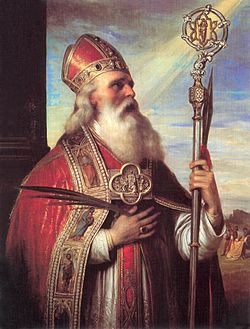| Gender | Male |
|---|---|
| Language | German |
| Origin | |
| Meaning | noble bright |
| Other names | |
| See also | Adalberto, Albert, Adelbert, Adalberht, Adalbrecht, Albrecht, Elbert, Alberto |

Adalbert is a German given name which means "noble bright" or "noble shining", derived from the words adal (meaning noble) and berht (shining or bright). Alternative spellings include Adelbart, Adelbert and Adalberto. Derivative names include Albert and Elbert.
Contents
Because St Adalbert of Prague (†997), early mediaeval missionary who became Czech, Polish and Hungarian patron saint, at his confirmation changed his name from native Vojtěch to Adalbert, this Germanic name has been artificially assigned to Slavonic Vojtěch/Wojciech ("he who is happy in battle") and via the same process have been the names Vojtěch and Adalbert connected with Hungarian name Béla (maybe "inner part") – so, in Central European settings these three names are taken as the equivalents, although they have no linguistic connection to each other.